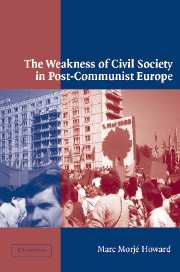Book contents
- Frontmatter
- Contents
- List of Figures
- List of Tables
- Preface
- 1 Introduction
- 2 An Experiential Approach to Societal Continuity and Change
- 3 Civil Society and Democratization
- 4 Post-Communist Civil Society in Comparative Perspective: An Empirical Baseline
- 5 Explaining Organizational Membership: An Evaluation of Alternative Hypotheses
- 6 Why Post-Communist Citizens Do Not Join Organizations: An Interpretive Analysis
- 7 Conclusion
- Appendix A Coding of the Variables
- Appendix B Country Scores on the Main Variables
- Appendix C The Post-Communist Organizational Membership Study (PCOMS) Survey
- Appendix D The In-Depth Interviews
- References
- Index
7 - Conclusion
Published online by Cambridge University Press: 05 June 2012
- Frontmatter
- Contents
- List of Figures
- List of Tables
- Preface
- 1 Introduction
- 2 An Experiential Approach to Societal Continuity and Change
- 3 Civil Society and Democratization
- 4 Post-Communist Civil Society in Comparative Perspective: An Empirical Baseline
- 5 Explaining Organizational Membership: An Evaluation of Alternative Hypotheses
- 6 Why Post-Communist Citizens Do Not Join Organizations: An Interpretive Analysis
- 7 Conclusion
- Appendix A Coding of the Variables
- Appendix B Country Scores on the Main Variables
- Appendix C The Post-Communist Organizational Membership Study (PCOMS) Survey
- Appendix D The In-Depth Interviews
- References
- Index
Summary
In previous chapters, while providing relevant theoretical and empirical context, I have kept the discussion focused on the specific topic at the heart of this book: participation in the organizations of civil society in post-communist Europe. This concluding chapter, in contrast, has a broader and more speculative purpose. I consider three important themes that are central to wider debates about the future of the region. First, I explain how the arguments and findings of this book should change overall conceptions of the region of post-communist Europe, particularly with regard to the lasting impact of the societal legacies of the communist experience. I argue that analysts have tended to focus too much on elites and institutions rather than on society and ordinary citizens, and that they have therefore been too quick in overlooking or dismissing the relative societal similarities among post-communist countries in the region.
Second, I discuss and interpret the relevance of my empirical findings for the prospects for democracy and democratic stability in the region, addressing both positive and negative interpretations. I argue that, while the weakness of civil society does not necessarily mean that post-communist democracy is in danger of collapse or breakdown, it does prevent the development of the “civic skills” that are so important for supporting and consolidating a democratic system, and it also ensures that many post-communist citizens lack the institutional representation and leverage that could otherwise be provided them by active voluntary organizations.
- Type
- Chapter
- Information
- The Weakness of Civil Society in Post-Communist Europe , pp. 146 - 163Publisher: Cambridge University PressPrint publication year: 2003



